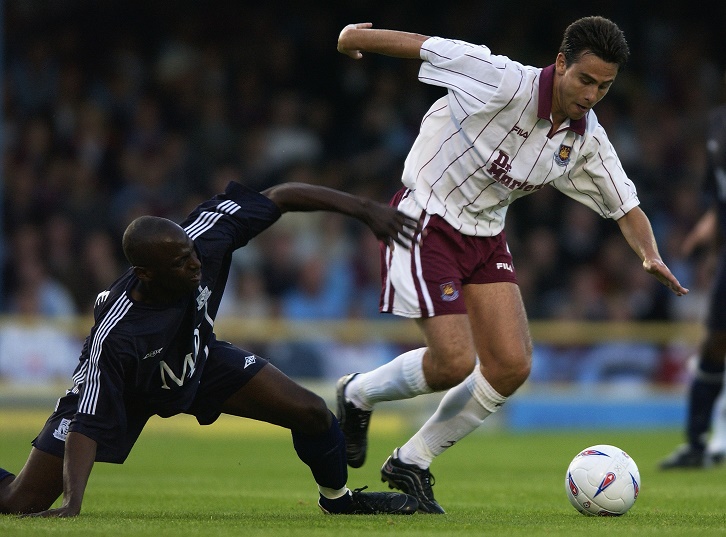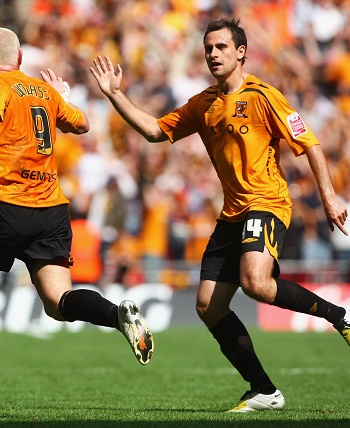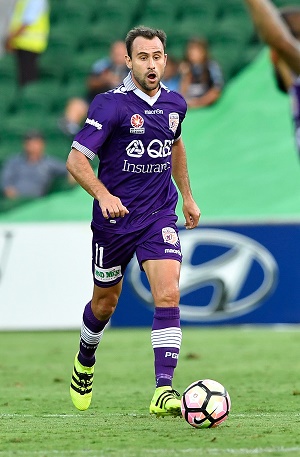
Richard Garcia will watch with interest from his home in Australia as West Ham take on Hull City this weekend. The 35-year-old played for both clubs during an impressive 12-year senior career in English football.
After leaving home in Perth at the age of 15 to travel across the globe and join West Ham’s Youth Academy, the striker played a key role in our memorable FA Youth Cup triumph in 1999, scoring in every round including the emphatic 9-0 aggregate victory over Coventry City in the final.
However, while gaining first team experience on loan at Leyton Orient in November 2000, he suffered a serious knee ligament injury that severely halted his progress. After battling back bravely, Garcia made his senior Hammers debut in a League Cup tie against Reading in September 2001 and went on to make a further 15 appearances for the club before joining Colchester United in September 2004.
After three years with the Essex club, Garcia joined Hull on a free transfer in July 2007 and played a key role as the Tigers won promotion to the Premier League via the play-offs in his first season. A full international call-up with Australia followed, before another serious knee injury in 2009 again held him back.
After returning to Australia in 2012 to join A-League side Melbourne Heart, he had further spells with Sydney FC and Minnesota United in the USA, before life came full circle in July 2014 when he signed for hometown team Perth Glory, where he is now club captain and working towards a career in coaching.
Here Richard talks to whufc.com about his love for both clubs and his eventful career…
Saturday’s game is a big one for both clubs.
We are coming to the business end of the season now and there is a lot at stake, which often makes for nervy matches, when one mistake can make the difference. Both teams have had indifferent seasons but, generally, the club with more experience at that level tends to be better at dealing with the pressure when it gets to this stage. Hence why I think West Ham will be slightly more capable in that respect and, if they play to their maximum, should come out on top. I still think Hull are a club who have got a lot to offer in the Premier League, though, and their experience is growing all the time.

I still keep a close eye on West Ham’s fortunes and watch games whenever I can.
It’s obviously been a tough year and they have had a lot to deal with. The club went through a major, major change last summer and that isn’t always as clear-cut as people might think. There have been lots of ebbs and flows, but they have generally kept things together and stayed strong when they’ve needed to. When you’ve been at one place for so long and then move into new surroundings, it is always going to take time to adjust and build familiarity. And that is the case if you’re playing in a new stadium or even a new league. Everyone needs time to get used to it, and I definitely think West Ham will be stronger and more settled next season.
I can’t believe it’s 20 years since I left home to join West Ham.
It’s scary really, and makes me feel old! But the memories are as wonderful now as they were then. I loved every minute of my time at the club. And the experiences I had at West Ham really made me the man I am today. I left home at 15 to live on the other side of the world, which is quite remarkable now when you think about it. But West Ham has always been a fantastic family club, with such great people behind the scenes, and that really was the key to the fact that I settled in so well and didn’t get homesick at that young age. I was made to feel so welcome and I’m so grateful for that. It’s why the club will always be so close to my heart.
The 1999 FA Youth Cup run was an unforgettable experience.
We had a fantastic group of lads, managed by Tony Carr and Peter Brabrook, who really got the best out of us and not only developed us as players, but also as people. The majority of that team went on to have some form of professional career in the game, whether it be at the very top in the case of Joe (Cole) and Michael (Carrick) or in the lower leagues, and I think that had a lot to do with the character of that team and the belief that was instilled in us by the coaches. Whenever I speak to the guys now, we still mention that night at Upton Park, for the second leg of the final against Coventry. Starting the match and seeing fans walking around the side of the pitch to get into the stands that hadn’t been opened was amazing. To have the entire stadium packed to support us spurred us on to that performance and it was such a special night. I’ll never, ever forget it.
I don’t have any regrets about how things turned out at West Ham.
The knee injury was obviously a huge blow, because it came at a time when I was possibly on the brink of progressing through to the first team and hopefully establishing myself. But it’s one of those things that happens in sport, and there is no point wondering what might have been. It took me a while to get myself back from that and up to the right level of form, but by that point the club were in a difficult position under Glenn Roeder and it probably wasn’t the right environment to give a young player a run of games. In that period, I needed to be playing regular football rather than making the odd appearance here and there. Then I had an opportunity to go away to play for the Olyroos (Australia U23s) at the Olympics. Alan Pardew was the manager at the time and he didn’t really want me to go. But I went, and got injured again, and that was really the defining moment. Pards hadn’t really seen enough of me, and I needed to move on for the good of my career.

I’m proud of the fact that I did it the hard way to eventually get to the Premier League.
I worked hard at Colchester to get things back on track, and it was very satisfying to then go to Hull and win promotion in the first season, and then become an established player in the top flight. When I came over as a 15-year-old and had to make those sacrifices, leaving family and friends, that was my goal and my ambition, and I don’t think I was willing to leave England without that becoming a reality. To be a part of Hull’s first-ever top flight season was a wonderful experience, and I also became the club’s first-ever player to appear in the World Cup in 2010, which obviously makes me very proud.
After many years away, it’s great to now be back among family and friends.
It was always in my mind that I wanted to come back home at a decent age and enjoy playing here at a level that I could be proud of. I didn’t want to come back at 35 or 36 and not have much time playing in front of friends and family. Having left at 15, I really had that urge to play in front of the Australian public on a regular basis. I’ve had the last three years back home in Perth, and this last year I’ve being working towards the next pathway, which is hopefully coaching. That’s another challenge and something I will try to grab with both hands. The biggest lesson I learned at West Ham was that it’s a privilege and honour to be involved in the game. It’s not a given right, and the harder you work the more chance you have of succeeding.
Follow Richard Garcia on Twitter at @RichGarcia19